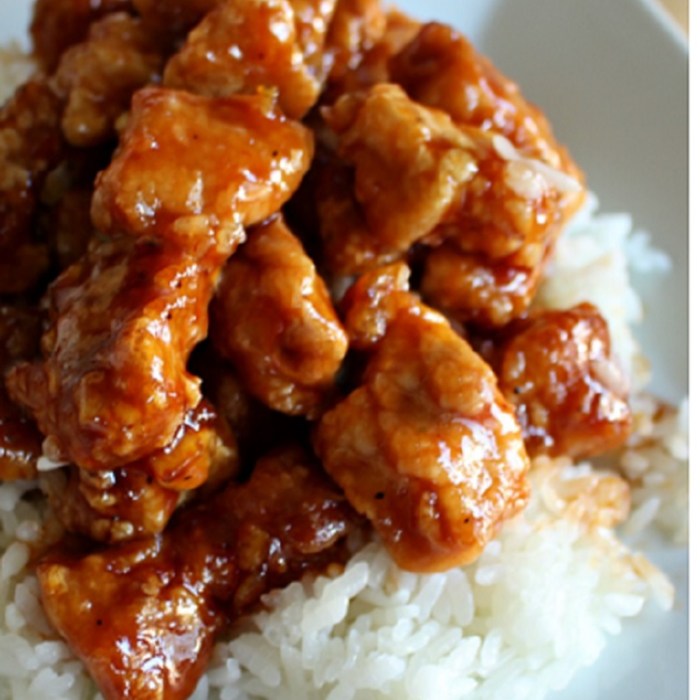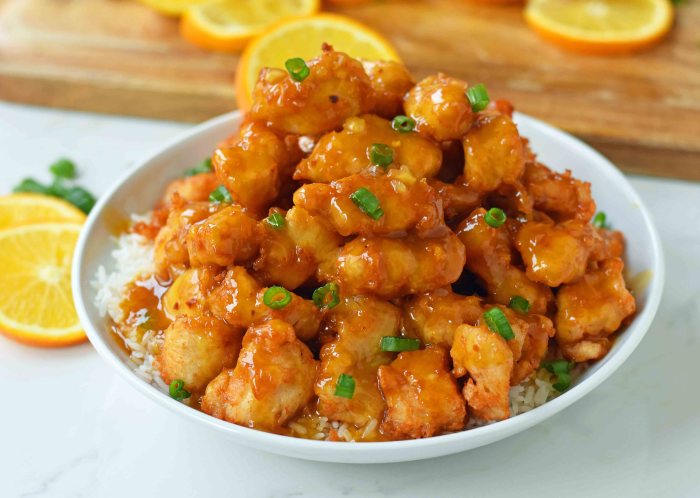Orange Sauce Recipe for Chicken
Orange Sauce for Chicken: A Culinary Exploration: Orange Sauce Recipe For Chicken
Orange sauce recipe for chicken – Orange sauce, a vibrant and versatile condiment, elevates chicken dishes from simple to sublime. Its adaptability as both a marinade and a glaze, combined with its rich history and diverse flavor profiles, makes it a culinary staple across various cultures. This exploration delves into the art of crafting the perfect orange sauce, covering its history, essential ingredients, recipe variations, cooking techniques, and serving suggestions.
Introduction to Orange Sauce for Chicken
Orange sauce’s versatility shines in its dual role as a marinade and a glaze. As a marinade, it infuses chicken with bright citrus notes and tenderizes the meat. Applied as a glaze during or after cooking, it creates a glossy, flavorful coating that enhances both taste and visual appeal. The origins of orange chicken sauce are diverse, reflecting influences from various cuisines.
Chinese cuisine, in particular, showcases its prominence in dishes like orange chicken, where the balance of sweet and savory is paramount. Variations range from intensely sweet to subtly savory and even fiery spicy, depending on the desired flavor profile.
Essential Ingredients and Their Roles

Source: cloudinary.com
The foundation of a delicious orange sauce rests on a few key ingredients. Orange juice, of course, provides the signature citrus flavor and acidity. Sugar (or honey) balances the tartness, creating sweetness. Soy sauce contributes savory depth and umami. Cornstarch or arrowroot powder thickens the sauce to the desired consistency.
Garlic and ginger add aromatic complexity. The choice of orange significantly impacts the final flavor. Navel oranges offer a sweeter, more balanced profile, while mandarins lend a more intense citrus tang. Freshly squeezed orange juice is undeniably superior, offering a brighter, more nuanced flavor compared to bottled juice, though bottled juice can be a convenient substitute.
Recipe Variations: Sweet, Savory, and Spicy, Orange sauce recipe for chicken
Three distinct orange sauce recipes illustrate the versatility of this condiment. Each recipe emphasizes a specific flavor profile: sweet, savory, and spicy. The differences in ingredients and techniques highlight the range of possibilities.
| Ingredients | Quantity | Units | Notes |
|---|---|---|---|
| Orange Juice (Sweet) | 1 cup | Freshly squeezed, navel oranges preferred | |
| Sugar (Sweet) | 1/2 cup | Adjust to taste | |
| Soy Sauce (Sweet) | 2 tbsp | Low sodium preferred | |
| Cornstarch (Sweet) | 2 tbsp | Mixed with 2 tbsp cold water |
| Ingredients | Quantity | Units | Notes |
|---|---|---|---|
| Orange Juice (Savory) | 1 cup | Freshly squeezed, any type | |
| Soy Sauce (Savory) | 1/4 cup | Dark soy sauce adds color and richness | |
| Rice Vinegar (Savory) | 2 tbsp | Adds brightness | |
| Ginger (Savory) | 1 tbsp | minced | Fresh ginger preferred |
| Cornstarch (Savory) | 1 tbsp | Mixed with 2 tbsp cold water |
| Ingredients | Quantity | Units | Notes |
|---|---|---|---|
| Orange Juice (Spicy) | 1 cup | Freshly squeezed, mandarin oranges preferred | |
| Soy Sauce (Spicy) | 3 tbsp | ||
| Chili Garlic Sauce (Spicy) | 1-2 tbsp | Adjust to desired spiciness | |
| Honey (Spicy) | 2 tbsp | Balances the spice | |
| Cornstarch (Spicy) | 2 tbsp | Mixed with 2 tbsp cold water |
| Sauce Type | Sweetness | Sourness | Savory | Spice |
|---|---|---|---|---|
| Sweet | High | Medium | Low | None |
| Savory | Low | Medium | High | None |
| Spicy | Medium | High | Medium | High |
Cooking Methods and Techniques
Creating orange sauce involves simmering the ingredients until thickened and glossy. The cornstarch slurry is crucial for achieving the desired consistency. Reducing the sauce over medium heat concentrates the flavors. A glossy finish indicates perfect reduction. The sauce can be used to marinate chicken beforehand for enhanced flavor, basted during cooking for even coating, or glazed after cooking for a beautiful shine.
Achieving the perfect consistency requires careful attention to the amount of cornstarch used and the simmering time. A slightly thinner sauce works well as a marinade, while a thicker glaze is ideal for coating cooked chicken.
Serving Suggestions and Pairings
Orange chicken pairs beautifully with a variety of side dishes. The bright citrus notes complement many flavors.
- Steamed rice
- Stir-fried vegetables
- Noodles
- Roasted potatoes
Presentation is key. Serve the chicken generously coated in the sauce, garnished with chopped green onions or sesame seeds. Boneless, skinless chicken breasts offer convenience and even cooking, while bone-in thighs provide more flavor and moisture. Chicken breasts cook quickly and are versatile, while thighs remain juicy even when cooked thoroughly.
Visual Descriptions of Orange Sauce Textures and Colors

Source: modernhoney.com
A well-made orange sauce boasts a vibrant, glossy sheen. The color should be a rich, deep orange, reflecting the quality of the orange juice used. The texture should be smooth and slightly thick, coating the chicken evenly without being overly sticky or runny. The finished dish showcases the glistening orange sauce clinging to the chicken, creating a visually appealing contrast between the bright sauce and the chicken’s color.
The use of dark soy sauce can deepen the sauce’s color, while the addition of ingredients like chili flakes can create visual interest.
Troubleshooting Common Issues

Source: christieathome.com
A vibrant orange sauce elevates simple chicken dishes, offering a zesty counterpoint to the meat’s richness. If you’re looking for inspiration beyond traditional recipes, you might find some interesting ideas by checking out discussions on in n out sauce recipe reddit , as their unique sauce blends offer a different flavor profile that could inspire your own orange sauce creation.
Ultimately, the best orange sauce for your chicken will depend on your personal preference and desired level of sweetness and tang.
Several issues can arise during orange sauce preparation. A sauce that’s too thin may indicate insufficient cornstarch or inadequate simmering time. Adding more cornstarch slurry and simmering longer can remedy this. A sauce that’s too thick can be thinned by adding a little water or orange juice. A bitter sauce might result from using overripe or bitter oranges.
Using fresh, high-quality oranges and adjusting the sugar can help balance the flavor.
Popular Questions
Can I use frozen orange juice?
While fresh juice is preferred for optimal flavor, thawed frozen orange juice can be substituted. Be sure to remove any ice crystals before using.
How long can I store leftover orange sauce?
Store leftover sauce in an airtight container in the refrigerator for up to 3 days.
What if my sauce is too thin?
Simmer the sauce over low heat for a longer period to reduce it and thicken the consistency. You can also add a cornstarch slurry (1 tbsp cornstarch mixed with 2 tbsp cold water) to thicken it.
What if my sauce is too thick?
Add a small amount of water or orange juice to thin the sauce to your desired consistency.
Can I make this sauce ahead of time?
Yes, the sauce can be made up to 2 days in advance and stored in the refrigerator.
















